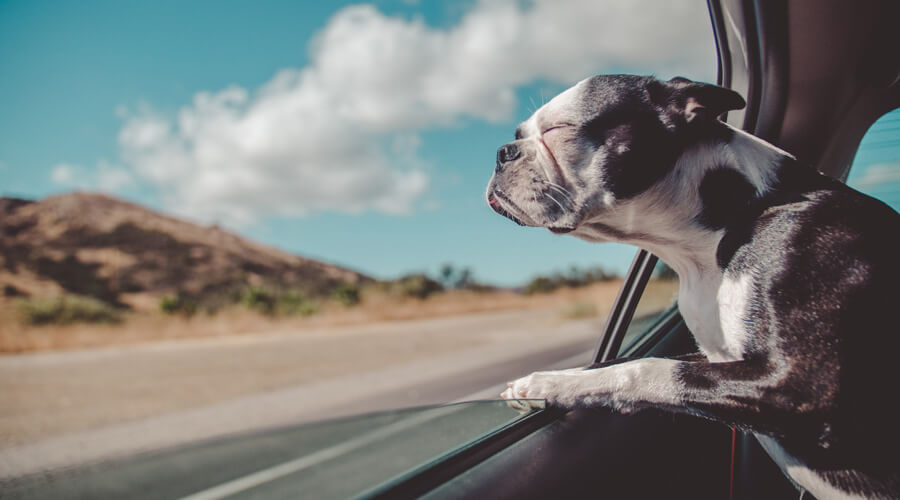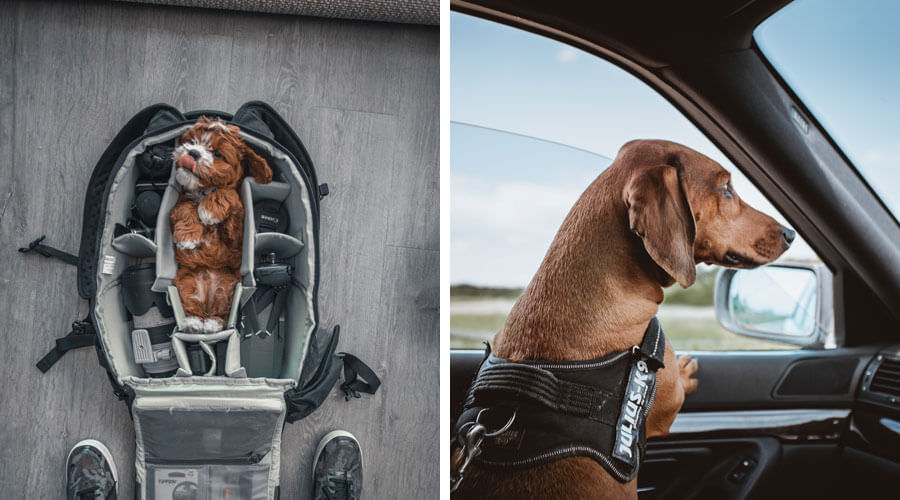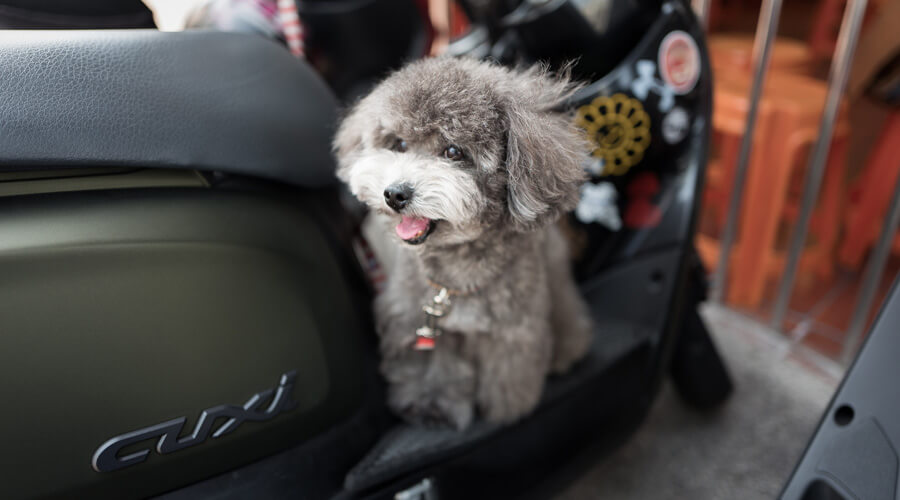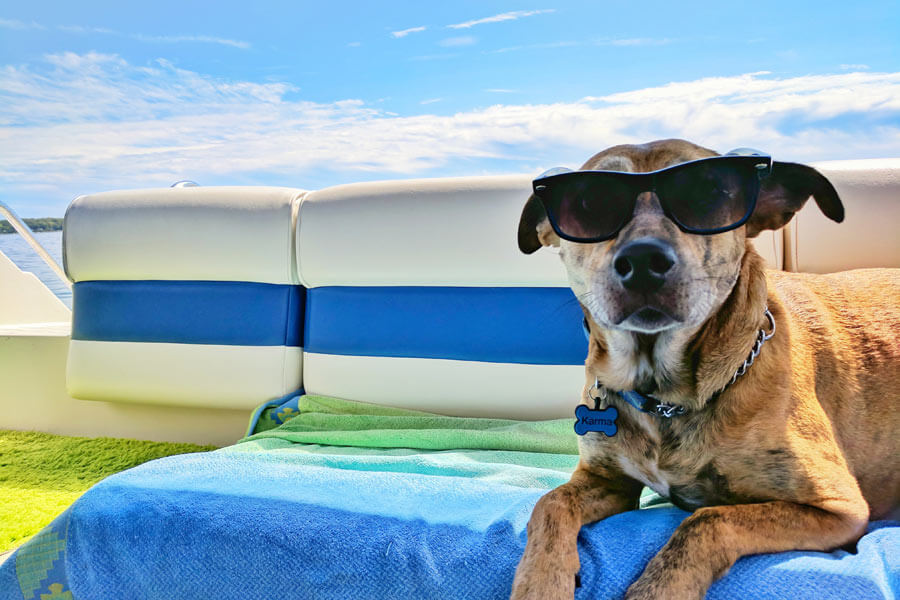Many people like to take their pet on holidays. So it pays to have a few pet travel safety tips up your sleeve to pass on to clients considering taking their four-legged friend on vacation with them.
The growing trend in taking pets on holidays can be seen with the rising number of pet-friendly accommodation options. From pet-friendly campsites and cabins to holiday homes and more — there’s never been a better time for pet owners to include their companion animal in their holiday plans.
However, whether travelling by car or plane, pet travel safety is an important consideration. As industry professionals, you are in an ideal position to advise clients on the best way to prepare their pet for travel. As well as offering tips to ensure its safety during the journey.

Pet travel safety — By car
When it comes to pet travel safety, a harness, cage or some sort of restraint is essential. There are plenty of stores offering all the pet travel accessories a pet owner needs. From pet cages and booster seats to dog seatbelts, travel harnesses and even car seat covers — there are a myriad items available to keep pets safe during travel.
Remind people that it is part of their duty as a responsible pet owner to keep their animal safe while travelling. Not only is it dangerous for a pet to be unsecured while travelling in the car, it’s also against the law.
Additionally, police can and will fine a driver if an animal is causing the driver to not be in full control of the vehicle. Likewise, if they are driving with a dog on their lap.
As such, animals should be seated or housed in an appropriate area of the vehicle. And while it’s not against the law for a dog to travel, restrained, in the front seat — should the air bag be deployed, it can severely injure or kill an animal.
When it comes to smaller cats and dogs, suggest the use of a booster seat or pet cage to ensure the animal’s safety.

Car travel tips for pet owners
Particularly important for pets that aren’t used to trips in the car, urge pet owners to do a few trial runs before embarking on a mammoth car journey with their beloved pet.
Simply suggest doing a few short trial runs to make sure the animal is okay in the car.
Also, remind clients to take adequate food and water for the trip. A no-spills pet bowl is a worthwhile purchase to ensure pets have adequate access to water along the way. Plus, suggest pet owners try to keep their pets feeding routine on par with the usual activity.
Remind clients to factor in a few ‘comfort breaks’ for their pet along the way. They should allow ample time to walk and toilet their pet.
Finally, advise pet owners to pack a pet first aid kit — just in case!
Pet travel safety — By plane
If your client is intending on transporting their pet by aeroplane, be sure to offer up some essential advice and tips to help them prepare their pet for travel.
Indeed, it is important pets are checked for fleas and ticks, and that their vaccinations are up to date.
Also, for pets that aren’t used to being confined, pet owners might want to consider caging their pet for a short time each day to help them adjust.
Some pet owners may worry that their four-legged friend will get hungry on the journey. However, urge clients not to overfeed their pet prior to travel. Instead, they should stick to their normal feeding routine.
Suggest pets get some exercise prior to boarding their flight. This will help them settle and might even help relax a nervous traveller.
It’s not uncommon for pets to urinate and defecate in their travel cage. As such, advise pet owners to take a clean towel and perhaps even some doggy shampoo so they can clean their pooch once they arrive at their final destination.
Like humans, pets can become tired and little off colour after travelling. While this isn’t a major cause for concern, encourage pet owners to keep a close eye on their furry friend after travel.
If they identify any unusual behaviour they should be advised to contact a local vet.

General pet travel safety tips
Know your client is planning on taking their pooch or feline friend on holidays? Help them prepare by reminding them of a few important points.
For example, pet owners should consider whether their pet is healthy enough to travel. This is particularly important with older pets or those on medication.
Vets can offer to do a check-up of the animal’s health and provide a print out of the animal’s medical history, in case of emergency. Give the client your business card too – just in case they need to contact you.
Ensure the animal has the necessary pet ID required. Pet owners might also want to consider taking a few editable ID tags with them. That way if they plan to travel, stopping at different places along the journey, they can deck out their pet with a new ID tag with the correct address at each stop.
Pets can become stressed in unfamiliar circumstances or situations. Suggest taking towels or blankets in case of an accident. Familiar toys or an item with a recognisable scent can help comfort and calm an animal. It can also help them to settle into their new surroundings once they arrive.
Holidaying with pets can be a fantastic experience for both animal and pet owner, but it definitely pays for people to do their homework and prepare well.
Plus, clients who don’t have pet insurance might want to consider it for peace of mind. And don’t forget to remind those with pet insurance to take the details and contact numbers with them.

Latest posts by Liz Walden (see all)
- Pet health: Medicinal cannabis for pets - December 27, 2021
- What pet business insurance do I need? - November 17, 2021
- Pet sitters: how to take time off - November 15, 2021










Leave A Comment